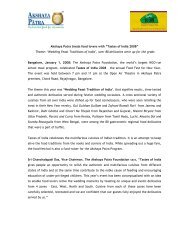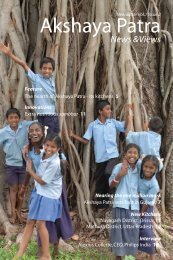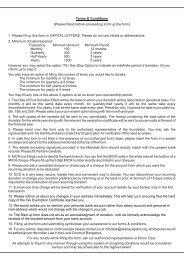The Top 100 NGOs 2013. - Akshaya Patra
The Top 100 NGOs 2013. - Akshaya Patra
The Top 100 NGOs 2013. - Akshaya Patra
You also want an ePaper? Increase the reach of your titles
YUMPU automatically turns print PDFs into web optimized ePapers that Google loves.
=<br />
In the recent documentary Solar Mamas, a 32-year-old,<br />
tent-dwelling Jordanian mother with only five years of<br />
primary education travels to India for six months of<br />
hands-on training, culminating in a return to her desert<br />
community armed with the skills to fabricate, install and<br />
maintain solar power technology – a journey that would seem<br />
scarcely believable, save for the fact it has been replicated by<br />
others time and time again. Founded by Bunker Roy in 1972<br />
to provide basic services and solutions to problems in rural<br />
communities in his native India, Barefoot College has since<br />
nurtured a form of grassroots social entrepreneurship that has<br />
won plaudits for its success in helping participants forge their<br />
own path out of poverty.<br />
Open only to individuals without a formal education, the<br />
organization’s innovative – and powerful – model employs<br />
peer-to-peer learning, grounded in practical knowledge, to<br />
demystify and decentralize sophisticated technology, in the<br />
process training an army of ‘barefoot professionals’: teachers,<br />
doctors, midwives, mechanics and architects in the millions.<br />
sPecial FeaTure sPecial FeaTure<br />
© sPringBox Films © DeBorah esPinosa © ashoka<br />
© one acre FunD<br />
15 16 17<br />
18<br />
Barefoot College Landesa Ashoka<br />
One Acre Fund<br />
solar mamas anD BareFooT ProFessionals TransForming rural lives Through lanD righTs <strong>The</strong> social enTrePreneurshiP evangelisTs<br />
sowing <strong>The</strong> seeDs oF imProveD FooD securiTy<br />
18<br />
40 42<br />
hQ locaTion: inDia hQ locaTion: uniTeD sTaTes hQ locaTion: uniTeD sTaTes<br />
hQ locaTion: kenya<br />
© sylvain Piraux For aPoPo © rooT caPiTal © sylvain Piraux For aPoPo<br />
© rooT caPiTal<br />
<strong>The</strong> gloBal Journal + January & FeBruary 2013<br />
An outlier amongst the <strong>NGOs</strong> making up this ranking,<br />
the Seattle-based Landesa works to secure land rights<br />
for the world’s poorest people – those 2.47 billion<br />
chiefly rural individuals who live on less than two dollars a<br />
day. Of this group, more than a billion lack legal rights over<br />
the land they use to survive, causing entrenched poverty<br />
cycles to persist over generations. For more than 40 years,<br />
the organization has worked to advance durable land rights to<br />
achieve transformational change on a large scale.<br />
More precisely, Landesa works with governments and other<br />
local organizations to create tailored approaches to expanding<br />
land rights to the rural poor. In all, the NGO has helped<br />
bring security of tenure to more than 105 million families,<br />
representing a beneficiary pool of over 400 million people.<br />
This has included the innovative use of a scalable ‘micro-plot’<br />
– tennis-court-sized pockets of land – strategy in India, which<br />
despite their small size, have been proven to boost family<br />
income, enhance nutrition and provide physical security.<br />
When wading through a sea of non-profit annual<br />
reports and press material, it can appear ‘social<br />
entrepreneurship’ is the term on everybody’s lips.<br />
How easy it is to forget, then, that back in 1981 when a 20<br />
year-old Bill Drayton launched Ashoka as an organization<br />
dedicated to supporting the dreams of social innovators<br />
worldwide, he was walking a solitary path. Thirty years later,<br />
and Ashoka has evolved into an association of over 3,000<br />
fellows in more than 70 countries.<br />
Fundamental to the Ashoka model is a tripartite approach<br />
identifying and investing in leading social entrepreneurs,<br />
engaging communities of entrepreneurs to develop patterns<br />
of effective collaboration, and working to deliver necessary<br />
infrastructure, such as access to social financing, bridges to<br />
business and academia, and the frameworks for effective cross<br />
sector partnerships. While the organization’s global reach<br />
is incalculable, evaluation has show that over 80 percent of<br />
alumni are driving systemic change at a national level within<br />
ten years, while 96 percent of their ideas have been replicated<br />
by independent groups.<br />
<strong>The</strong>gloBalJournal.neT<br />
56 57<br />
After having served as a strategic consultant to Fortune<br />
500 companies, Andrew Youn decided to spend the<br />
summer before his second year of MBA studies as<br />
an intern in Kenya learning about the root causes of rural<br />
poverty and chronic hunger. <strong>The</strong> experience proved to be<br />
transformative. A year later, in 2006, he founded One Acre<br />
Fund as a means to improve livelihoods amongst subsistence<br />
farmers using market-based methods as an alternative<br />
to traditional food aid. From this innovative idea, the<br />
organization has expanded to serve over 130,000 farming<br />
families in Kenya, Rwanda and Burundi.<br />
At the core of the One Acre Fund program is a ‘market<br />
bundle’ of services – including seed and fertilizer, financing,<br />
education and market facilitation – that enables farmers<br />
to double their income per planted acre in one year.<br />
Committed to data-driven program development and donor<br />
accountability, the organization has also pioneered a rigorous<br />
system of internal and external performance monitoring used<br />
to ensure increased scale is not pursued at the cost of quality<br />
of impact and sustainability.





